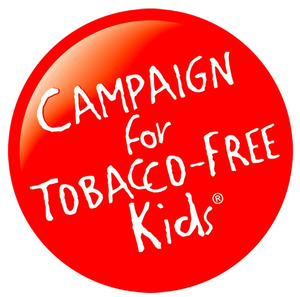WASHINGTON, Feb. 28, 2013 /PRNewswire-USNewswire/ -- The following is a Statement of Matthew L. Myers, President, Campaign for Tobacco-Free Kids:
A study published today by researchers at the Centers for Disease Control and Prevention (CDC) shows a significant increase in awareness and use of electronic cigarettes, which are not currently regulated by any government agency to protect public health. Manufacturers have exploited this regulatory loophole to aggressively market e-cigarettes, often with claims that they can help smokers quit or that they are a safe alternative to traditional cigarettes. Due to the lack of regulation, no one knows how much nicotine and other substances are in the different e-cigarettes, and manufacturers have not had to provide any scientific evidence to support their claims or to comply with public health regulations intended to protect consumers from deceptive claims.
(Logo: http://photos.prnewswire.com/prnh/20080918/CFTFKLOGO)
The growing use of e-cigarettes and the unproven health claims being made about them underscore the need for the Food and Drug Administration to quickly assert authority over all tobacco products, including e-cigarettes. The FDA announced in December 2010 that it intended to do so, but over two years later, it has yet to act. The landmark 2009 tobacco regulation law directed the FDA to regulate cigarettes, smokeless tobacco, cigarette tobacco and roll-your-own tobacco. The law authorized the agency to extend its authority to all other tobacco products.
The FDA must act quickly to close gaps and loopholes in the law and ensure that all tobacco products and products that claim to help smokers quit are regulated to protect public health. If e-cigarette manufacturers want to claim that their products can help smokers quit, they should be subject to the same rigorous scientific review as other smoking cessation products. If they want to claim that e-cigarettes are a healthier alternative to other tobacco products, they should follow the process established by the 2009 law for doing so. The law establishes safeguards to ensure that such claims are supported by science and don't do more harm than good by encouraging kids to start using tobacco or discouraging current tobacco users from quitting.
The new study, published in the journal Nicotine & Tobacco Research, found that 6.2 percent of all U.S. adults and 21.2 percent of current smokers surveyed in 2011 had ever used e-cigarettes. This is an approximate doubling of 2010 estimates. It also found that six in ten adults were aware of e-cigarettes in 2011, compared to four in ten in 2010.
The study points to several public health concerns about the growing use of e-cigarettes:
- "E-cigarettes have also been marketed as smoking cessation aids. However, there is currently no conclusive scientific evidence that e-cigarettes promote long-term cessation, and e-cigarettes are not included as a recommended smoking cessation method by the U.S. Public Health Service."
- "Many public health professionals are concerned that e-cigarettes may have an adverse impact on users' health, encourage smoking initiation, perpetuate the use of nicotine and tobacco products among smokers who might otherwise quit, and counter the effectiveness of smoke-free policies."
Effective FDA regulation of all tobacco products, including e-cigarettes, is critical to reducing the terrible toll of tobacco, which kills more than 400,000 Americans annually and is the number one cause of preventable death in the U.S.
The study abstract can be found at: http://ntr.oxfordjournals.org/content/early/2013/02/20/ntr.ntt013.abstract
SOURCE Campaign for Tobacco-Free Kids
WANT YOUR COMPANY'S NEWS FEATURED ON PRNEWSWIRE.COM?
Newsrooms &
Influencers
Digital Media
Outlets
Journalists
Opted In





Share this article